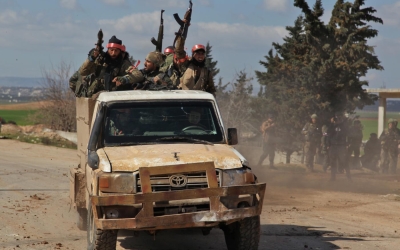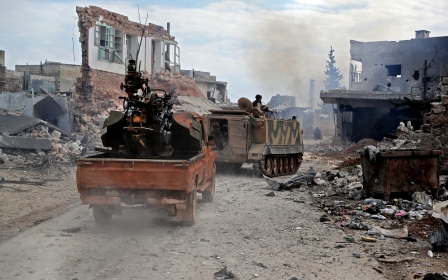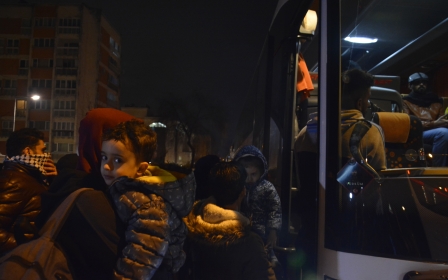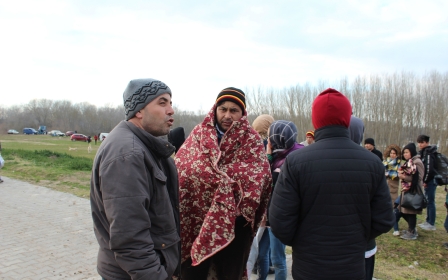Turkey will not abandon its military stations in Idlib, Erdogan says

Turkey will not withdraw troops from its 12 ceasefire observation stations in Syria's Idlib province, Turkish President Recep Tayyip Erdogan told journalists accompanying him to Moscow on Thursday night.
Erdogan said the Moscow ceasefire agreement signed by Turkey and Russia would safeguard Turkey against the Syrian government and terror attacks.
New MEE newsletter: Jerusalem Dispatch
Sign up to get the latest insights and analysis on Israel-Palestine, alongside Turkey Unpacked and other MEE newsletters
“It will ready the ground for stability and normalisation in Idlib region and guarantee the safety of our soldiers there,” Erdogan said. “It is an important step to protect civilians.”
Turkey, which backs Syrian rebels in and around Idlib, has poured arms and men into the province in an attempt to halt an offensive by pro-Damascus forces that has displaced nearly a million people towards the Turkish border.
The mutual escalation in Syria's northwest has led to violent and deadly confrontations between Turkish troops and Syrian government forces. Nearly 50 Turkish soldiers have been killed by Syrian attacks.
A ceasefire declared by Turkey and Russia on Thursday night seemed to be largely holding. However, just hours before the official introduction of the deal, the Turkish defence ministry announced that two more Turkish soldiers have been killed and three others wounded in an attack by the regime.
Meanwhile, the Syrian Observatory for Human Rights said that 15 people had been killed in clashes in the Jabal al-Zawiya region, in southern Idlib province, on Friday. Six Syrian soldiers and allied fighters had been killed, as well as nine fighters from the militant Turkistan Islamic Party, it said.
Several Turkish military stations in Idlib, established as part of a 2018 deal between Moscow and Ankara, are currently encircled by Syrian government forces.
“These observation points are very, very important for us. They will be preserved as they were in the past,” Erdogan said.
The Turkish president believes the latest ceasefire would be more successful than the others because he would be in instant contact with Russian President Vladimir Putin.
'These observation points are very, very important for us'
- Recep Tayyip Erdogan
“With our foreign minister, defence minister and national intelligence chief,” he said, “we will intervene whenever we see a crack. We reiterated our decisiveness on this issue.”
One of the fundamental components of Turkish-Russian relations is the S-400 missile defence system deal. Following the tensions between the two countries over the Idlib crisis, there were expectations in the West, specifically in the United States, that Turkey would opt not to activate the system, which is sanctionable under US law.
“The S-400 is our property and we have received all the parts,” Erdogan said. “And it will become active in April.”
Turkey and Russia have also been working together on Libya, where they support opposing parties, to reach a permanent ceasefire and launch a reconciliation process.
However, Turkey has criticised General Khalifa Haftar’s Libyan National Army (LNA) for violating the established deals. The Wagner Group, a Russian private army, has backed the LNA since early last year.
“I expect that President Putin will take some positive steps with regard to the Wagner,” Erdogan said.
Middle East Eye delivers independent and unrivalled coverage and analysis of the Middle East, North Africa and beyond. To learn more about republishing this content and the associated fees, please fill out this form. More about MEE can be found here.





